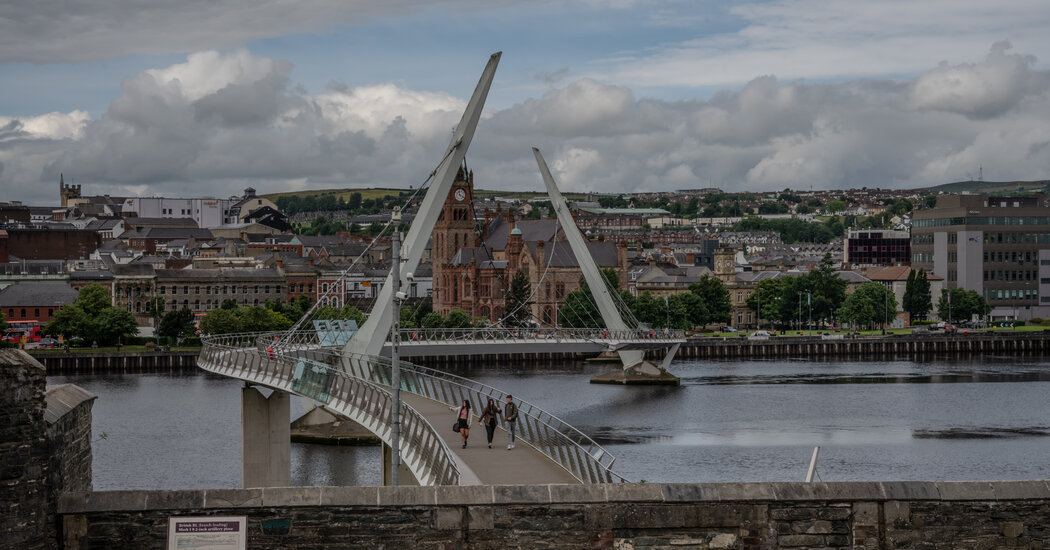
DERRY, Northern Ireland — Few cities are as caught between hope and history as Derry, the birthplace of the modern Troubles but also the backdrop for “Derry Girls,” the exuberant, wildly popular British TV series that chronicles the lives of five teenagers as that bloody period was drawing to an end in the 1990s.
Now, though, after nearly 25 years of peace, residents worry that Derry’s hard-won gains are in jeopardy. Brexit has disrupted Northern Ireland’s fragile political and economic equilibrium, while the British government seems determined to put the Troubles and its legacy of sectarian violence firmly in the past.
Two somber rituals last week — a day apart and on opposite sides of the River Foyle, which divides Northern Ireland’s second city — served to illustrate both Derry’s anguished past and its unsettled future.
Inside the city’s 17th-century stone walls, Amanda Fullerton joined families of victims in accusing the British government of shutting down investigations into killings during the Troubles, as the guerrilla war between Catholic nationalists and Protestant unionists is commonly known. Her father, Eddie Fullerton, was shot to death by members of a loyalist paramilitary group in 1991.
The next day, a loyalist flute-and-drum band marched through the Protestant neighborhood of Waterside to mark 31 years since the assassination of Cecil McKnight, a former paramilitary commander. The Irish Republican Army, or I.R.A., said it had targeted Mr. McKnight as revenge for the slaying of Mr. Fullerton.
Brexit has inflamed passions in many such loyalist and unionist neighborhoods — which favor remaining part of the United Kingdom — because it has necessitated complex trade arrangements with the European Union that unionists say drive a wedge between Northern Ireland and the rest of the bloc.
“Businesspeople will always find a way to do business with each other,” said Jim Roddy, City Center manager of Derry, which is also called Londonderry by unionists. “But dabble with people’s identity, and you get into something you just can’t control. The identity issue is so much more deep-seated.”
A onetime firefighter and chief of the Derry soccer club, Mr. Roddy, 62, has negotiated with groups on both sides to prevent rituals like parades and bonfires from erupting into violence. While Derry’s record of peaceful gatherings is good, he said he worried that Britain’s latest actions could stir up old animosities.
Identity issues are also being aggravated by so-called legacy legislation proposed by Prime Minister Boris Johnson, though in a different way. Intended to clear the deck of thousands of unsolved killings during the three decades of the Troubles, it would grant immunity from prosecution to people who cooperate in investigations conducted by a new Independent Commission for Reconciliation and Information Recovery.
But that would mean no new criminal investigations related to the killings, which has drawn fierce opposition from the families of victims on both sides. They say that it would deprive them of justice, especially in cases where British security forces or the police colluded with paramilitary gangs.
“We are the voice of our dad, and we won’t be silenced,” said Phyllis Kealey, whose father, Sean Dalton, was killed in 1988 by a bomb planted by the I.R.A. The Dalton family has long believed that the police knew that the house in which their father was killed was booby-trapped, and that they did nothing to prevent his death.
While the legislation, which the government hopes to pass this year, affects a much smaller number of people than the post-Brexit trade rules, it is easier to understand and, therefore, more capable of stoking tensions.
A small crowd gathered last week near Derry’s Guildhall to listen to the families of victims recount their stories behind a black-and-white banner that said, “No to British Government Legacy Cover-up.”
The debate over unsolved killings particularly haunts the police, who are still viewed in Derry with deep resentment by much of the public. For Marty Reid, the superintendent of the city’s police, overcoming suspicions about the legislation is the biggest hurdle to remaking his department’s image.
“The legacy issue is clearly a huge issue that causes hurt to a number of people,” Mr. Reid said. “It’s surely important, then, that we police sensitively, regardless of what decisions are made in Westminster.”
To the city’s boosters, the Troubles legislation and the trade rules, known as the Northern Ireland protocol, are unwelcome caveats to a sales pitch that emphasizes Derry’s young population, affordable housing and location, which gives it unfettered access to both the British and European Union markets.
“This city could be one of the gems of Europe,” said John Kelpie, the chief executive of the district council of Derry and neighboring Strabane. “We’re taking a golden-goose opportunity and potentially killing it outright.”
Neither he nor anyone else predicts a return to the horrific violence that engulfed Derry in 1969, marking the beginning of the modern era of the Troubles. In 1972, British troops killed 13 unarmed nationalist protesters in a clash known as “Bloody Sunday” that became one of the most infamous episodes of the conflict.
But paramilitary groups like the New I.R.A., the Irish National Liberation Army and the Ulster Defense Association still operate in Derry’s neighborhoods, mostly in the drug trade, according to Mr. Reid. The marching band that commemorated Mr. McKnight’s death carried a flag emblazoned with the Ulster Defense Association.
“With those groups around, there is always a risk of things ratcheting up,” said Peter Sheridan, a former assistant chief constable of the Police Service of Northern Ireland, formerly known as the Royal Ulster Constabulary. “Sectarianism is alive and well here, and that is the breeder of violence.”
Some argue that the coronavirus pandemic has worsened tensions because the months of lockdowns in Northern Ireland created an echo chamber in which people talked only with folks from their own families or neighborhoods.
And yet to visit Derry’s neighborhoods is to find a strange mix of clannish loyalty and civic open-mindedness. Mark Logan, 40, watched the Protestant parade around the corner from his tattoo studio, which is next door to the house where he grew up. Mr. McKnight, he said, lived at the end of the street.
Although Mr. Logan said he had a vague sense that the Northern Ireland protocol was complicating his ability to order pigments for tattoos, he confessed to having little understanding of how it worked. In any event, he said, none of this should take away from the positive developments that had transformed Derry since the Good Friday Agreement, the 1998 accord that ended the Troubles.
“There’s an odd spot of antisocial behavior here and there,” Mr. Logan said. “But Derry has done a pretty good job of getting beyond its past.”
Just down the street, developers are converting the former British military base, which once bristled with guns pointed across the river, into a lively complex with a craft brewery, a luxury hotel and offices for technology start-ups. Locals now sip pints while gazing at the serpentine Peace Bridge, which crosses the river, connecting Derry’s once-warring communities.
Damian Heron, a local developer, has built a gleaming office tower in the complex and plans another next to it. Derry’s low rents, compared with those in Dublin and London, has lured financial firms like Axa and technology giants like Fujitsu.
Mr. Heron claimed that no more than 5 percent of businesses are genuinely harmed by the protocol, which requires border checks on goods shipped to Northern Ireland from mainland Britain. (This is necessary to avoid resurrecting a border between the North and the Republic of Ireland, a member of the E.U.)
“There’s a political agenda and an economic agenda,” Mr. Heron said. “The politicians want to put them on the same track.”
Nothing has transformed Derry’s image more than “Derry Girls,” a comic, profane, often touching account of five teenagers — four girls and a boy — who make their way in a world filled with everyday high-school preoccupations, but also one in which their school bus can be held up by a bomb on the bridge. The show’s creator, Lisa McGee, a Derry native, drew on her own experiences and those of her friends.
A huge mural of the cast, painted on the side of Badgers Bar and Restaurant, is now a bigger draw with visitors than murals of loyalist or nationalist martyrs. American tourists still flock to a large painted sign in Bogside, a major Catholic stronghold, that informs visitors, “You are now entering Free Derry.”
Aisling Gallagher, a close friend of Ms. McGee’s, said the series accurately conveyed how the Troubles rumbled in the background, even as the teenagers “went on with their way of life.” If anything, she said, that quest for normalcy has only deepened in the decades since the Good Friday Agreement.
“A lot of people are just fed up with politics,” said Ms. Gallagher, 41, who works for the city. “They just tune it out unless it is going to affect them directly. We just want to have a few laughs and good craic,” she added, using an Irish colloquialism for the ineffable joys of a lively chat, often with a drink at hand.




